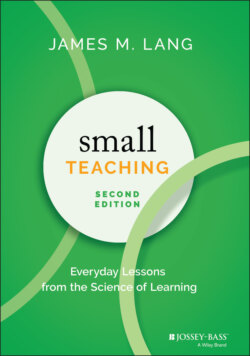Читать книгу Small Teaching - James M. Lang - Страница 18
PRINCIPLES
ОглавлениеAsking students to make predictions requires a very small investment of time, which makes predicting an ideal small teaching activity. The following principles can help guide the creation of prediction activities in your classroom.
Stay Conceptual. Remember that part of the reason predictions work is that they require students to draw up whatever knowledge they might have that will assist them in making their prediction. If you ask them questions that are so specific that they have no prior knowledge to activate, you won't see this benefit. It seems unlikely, for example, that asking students to predict the meaning of a word in a language with which they are totally unfamiliar, in a different alphabet, will offer much learning benefit. Focus prediction activities on the major conceptual material that will maximize their learning in the course.
Provide Fast Feedback. Close the loop on every prediction your students make by providing feedback as immediately as possible. Predictions made at the opening of a class session should be addressed within that class session. Those made at the end, even if they will be answered by the reading or studying that they will do for the next session, should still be reviewed at the opening of that next session. Predictions made in online environments should provide feedback within the same session they are made. Remember that you don't want wrong predictions hanging around in students' heads for very long; the more immediate the correction, the better.
Induce Reflection. As Daniel Willingham has argued, “Memory is the residue of thought” (Willingham 2014, p. 54). In other words, we remember what we spend a little time thinking about. Prediction provides an excellent spur for thought, in that you can ask students to think about why they made their prediction, what actually happened (if the prediction leads to direct observation), and why their prediction was right or wrong. If you are asking students at the beginning of a class to write down a prediction and having a few of them read their predictions aloud, return to those students at the end of class and ask them to explain why they made those predictions. Students who made correct predictions can be asked to articulate the principle or concept that helped them get it right; students who made incorrect predictions can repair their understanding by articulating the correct ideas.
